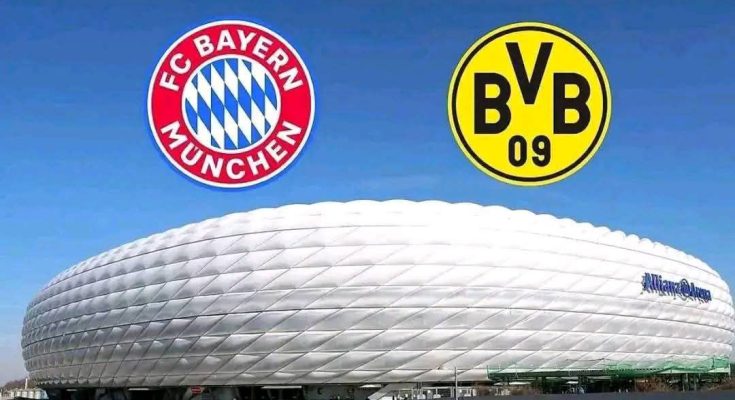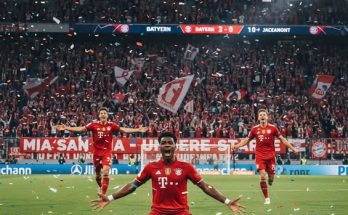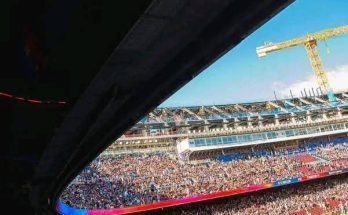In the fevered glare of stadium lights, amid the deafening roar of tens of thousands of supporters, Dortmund and Bayern wage war—not just for three points, but for dominance, identity, psychological edge. This is Der Klassiker, the theatre where fire meets fury, where history bleeds into every tackle, every sprint, every battle for space. There is no neutral ground here, only contested terrain, where both sides believe that to win is to assert supremacy in German football.
To understand the magnitude of the clash, one must trace the rivalry’s roots. Bayern Munich long stood as the hegemon of the Bundesliga, the embodiment of consistency, resource, ambition. Borussia Dortmund, meanwhile, rose as the scrappy upstart, the rebel with a cause, the club that bled black and yellow, that produced talent, that threatened the established order. Their meetings took on symbolic weight: the establishment versus the insurgent; wealth, power, tradition versus youth, energy, defiance. Over the decades, Bayern has amassed countless domestic titles; Dortmund fewer, but each one hard-earned and memorable. In head‑to‑head, Bayern dominate in quantity, but Dortmund produce moments of upheaval—shock wins in Munich, stunning comebacks in Dortmund, games that linger in memory.
When the two teams step onto the field, it’s instantly war. The opening whistle is not a beginning so much as a declaration of intent. Bayern’s stars—world‑class forwards, silk‑footed midfielders, defenders of menace—press, probe, seek to impose structure. Dortmund’s core—fast, aggressive, hungry—hit back, counter, harass, disrupt. The midfield becomes a cauldron: pressing triggers, late tackles, intercepted balls, and transitions. Bayern aim to orchestrate, to control; Dortmund aim to unsettle, to exploit gaps, to make Bayern uncomfortable.
Psychological warfare is ever present. Dortmund’s fans, in their yellow sea at Signal Iduna Park, generate one of the most intimidating atmospheres in world football—walls of chant, colored smoke, coordinated movement, light, noise. Bayern have often entered that cauldron with poise, but not without tension. On the road in Munich, Dortmund fans infiltrate the Allianz Arena, turning enemy territory into contested space. The mental edge shifts moment by moment. A small slip, a wobbled pass, a misjudged tackle, and the pendulum swings.
The physical battle is unrelenting. Fullbacks overlap, centerbacks surge forward, midfielders dive into challenges, forwards harry defenders. The margins are thin. A tackle that arrives a quarter-second late can derail momentum; a pressing trigger misread can open heavy space behind the defense. Bayern must break Dortmund’s shape; Dortmund must disrupt Bayern’s cadence. Sometimes it becomes a scrap in the corners, a duel in the air, a foul thrown to deny a swift counter. Cards accumulate. Nerves fray.
What makes Der Klassiker especially ferocious is that both clubs carry expectations. Bayern rarely accept anything but victory; anything less feels like failure. Dortmund likewise demand that they challenge; they must believe they can take it to the Bavarians. Each title race intensifies the stakes: if Bayern lead, Dortmund must claw back. If Dortmund lead, Bayern must crush resistance. That dynamic adds pressure: each slip is punished, each mistake magnified.
Consider recent clashes. In March 2024, Dortmund stunned Bayern 2–0 at the Allianz Arena, silencing the home crowd and reaffirming their capacity for shock. (Reddit) That moment was more than three points—it was defiance. On the flip side, Bayern have delivered hammer blows. In a 4–0 drubbing at Dortmund, they demonstrated dominance, ruthlessness, structural control. (Reddit) In 2022, Bayern’s 3–1 win clinched their tenth consecutive Bundesliga title, sealing their modern hegemony while denying Dortmund a chance to derail the coronation. (Sportstar) Each of such matches writes a new chapter in their rivalry.
Strategic nuance plays a crucial role. Bayern tend to rely on structure: well-defined width, rotation in midfield, overloads, positional intelligence. They try to dominate possession and lull opponents before striking. Dortmund often adopt more verticality, sudden surges, diagonal passes, pressing triggers to force errors. In transitions, Dortmund are dangerous—quick breaks unfolding from wide positions or long passes behind the defense. Bayern must guard against being pulled out of shape. In tight moments, set pieces, dead balls, and half-spaces decide fate.
Coaches carry heavy burdens. A misjudged substitution, a tactical tweak undone by the opponent, a moment of overconfidence can yield disaster. When Thomas Tuchel, or Julian Nagelsmann, or the Bayern manager faces Dortmund, the margin is razor-thin. When Edin Terzic, or his successor, leads Dortmund against Bayern, he must instill belief, calm nerves, anticipate adjustments. In Der Klassiker, the manager is also a duel: which side can outthink or out-adapt?
Players begin to feel the heat: defenders carry guilt after a conceded goal, forwards hunger for redemption after a miss, midfielders sweat over control, half-spaces, passing lanes. The crowd watches every touch. In Dortmund, fans jeer a misplaced pass; in Munich, fans expect precision. The aura of “Der Klassiker” amplifies everything.
On one occasion, Dortmund ended Bayern’s long unbeaten run at home—earning a 2–0 victory at the Allianz. That was not just an upset; it was psychological liberation. But Bayern, ever resilient, respond fiercely. Bayern’s relentless pursuit of titles often leads them to recalibrate, to deepen their squad, to force Dortmund into attrition.
This war also carries reputational stakes: who is the true standard-bearer of German football? Internationally, Bayern are often the face: the Champions League contenders. But Dortmund project youth, spirit, aesthetic boldness. Fans on both sides believe their identity more valid. When Dortmund beat Bayern, it feels like poetic justice; when Bayern beat Dortmund, it feels like inevitability asserted.
Over time the rivalry fuels itself. A match ends; fans and pundits replay key moments—missed chances, referee decisions, injuries, controversies. In social media, tensions roar. Players talk bravely, sometimes provocatively. The next meeting arrives heavier, charged by memory. Neither side truly rests—the war continues season after season.
One reason the clashes are so explosive is the balance: while Bayern may hold statistical dominance, Dortmund pose genuine threats. They are not historic also‑rans. They are challengers, masters of disruption. That keeps Bayern wary. For Dortmund, every Klassiker is a chance at narrative redemption.
Some matches become classics not for scoreline but swing. A late goal, a penalty, a VAR check, a red card. The tension in the final minutes, when both teams know the difference between triumph or regret. When Dortmund sense a late equalizer, the crowd rises. When Bayern smell closure, they hunt the killer blow. In that finale, everything sharpens.
And beyond tactics and psychology lies emotion. Rivalry, club pride, supporter identity. Players sense that some of these matches transcend the season. A young Dortmund player sent off in a Klassiker might carry that memory forever. A Bayern star scoring in a Klassiker cements legacy. The emotional stakes elevate the pitch.
So when fire meets fury in a Klassiker, the spectacle transcends a mere game. It is war: sustained, brutal, beautiful. The lines are drawn. The pitch is battlefield. Bayern bring the weight of history and resources. Dortmund bring hunger, spirit, unpredictability. They clash for dominance, for esteem, for proving who belongs at the summit. And no matter who wins, no matter the margin, The Klassiker endures—because in German football, after years, decades, the rivalry remains eternal: a war fought not in headlines or sales, but in every run, tackle, shot, and scream.



